|
|
|
Sort Order |
|
|
|
Items / Page
|
|
|
|
|
|
|
| Srl | Item |
| 1 |
ID:
177044
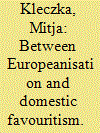

|
|
|
|
|
| Summary/Abstract |
Germany’s export-oriented defence industry, like most other “large” European producers, aims to maintain its “key” capabilities whilst the scope for national approaches narrows further. Given the rising economic and security challenges, it appears likely that Europeanisation will gradually proceed.
|
|
|
|
|
|
|
|
|
|
|
|
|
|
|
|
| 2 |
ID:
177043
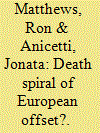

|
|
|
|
|
| Summary/Abstract |
This paper is concerned with evaluating the impact of the Procurement Directive, 2009/81/EC, on defence offset in Europe. The aim of the Directive was to reduce the extent of Article 346 derogations based on offset. Indirect offset has disappeared, and while the evidence is patchy, direct offset appears to be declining. This gradual demise of offset is in line with the global trend, especially among advanced countries. Offset is increasingly becoming a developing country phenomenon.
|
|
|
|
|
|
|
|
|
|
|
|
|
|
|
|
| 3 |
ID:
177041
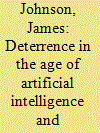

|
|
|
|
|
| Summary/Abstract |
How might nuclear deterrence be affected by the proliferation of artificial intelligence (AI) and autonomous systems? How might the introduction of intelligent machines affect human-to-human (and human-to-machine) deterrence? Are existing theories of deterrence still applicable in the age of AI and autonomy? The article builds on the rich body of work on nuclear deterrence theory and practice and highlights some of the variegated and contradictory – especially human cognitive psychological – effects of AI and autonomy for nuclear deterrence. It argues that existing theories of deterrence are not applicable in the age of AI and autonomy and introducing intelligent machines into the nuclear enterprise will affect nuclear deterrence in unexpected ways with fundamentally destabilising outcomes. The article speaks to a growing consensus calling for conceptual innovation and novel approaches to nuclear deterrence, building on nascent post-classical deterrence theorising that considers the implications of introducing non-human agents into human strategic interactions.
|
|
|
|
|
|
|
|
|
|
|
|
|
|
|
|
| 4 |
ID:
177045


|
|
|
|
|
| Summary/Abstract |
The famous American author, Henry James, stated that the Europe’s greatest enemy is “nationalism.” The domain of defence economics is shaped by the debate of EU nations having to make difficult choices based on the Treaty of the Functioning of the European Union (TFEU); between developing a national defence industrial base, which seems to promise security of supply for defence equipment; and moving towards integration with the hope of reducing costs and increasing interoperability.
|
|
|
|
|
|
|
|
|
|
|
|
|
|
|
|
| 5 |
ID:
177042
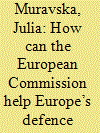

|
|
|
|
|
| Summary/Abstract |
The European Commission's proposal for the €13 bn European Defence Fund (EDF) to incentivise collaborative defence research and capability development projects with EU funding was an ambitious statement of policy intent to drive forward European defence cooperation. However, the summer 2020 EU budget negotiations left it with only about 60% of that amount over the 2021-2027 period. This debate contribution argues that despite this curtailment in resource and ambition, the European Commission can still maximise the EDF's impact to benefit European defence industry by ensuring that the various defence industrial policy activities it is already leading are achieving their full potential, incentivising EU governments to acquire and use the capabilities developed through the Fund, and maintaining coherence amongst existing research projects, capability development projects, and joint capability requirements.
|
|
|
|
|
|
|
|
|
|
|
|
|
|
|
|
| 6 |
ID:
177040
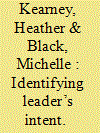

|
|
|
|
|
| Summary/Abstract |
One of the most challenging tasks for a deterrence planner is assessing a leader's intent, which requires having an in-depth level of subject-matter expertise. This article investigates this challenge and offers answers to the following question “how can we identify a leader’s intent” to aid deterrence planners, operators, and policymakers? To examine this question, we used a multi-method approach by performing several qualitative analyses on Kim Jong-Un’s New Year’s Eve speeches (2013–2018). We focused on techniques that assessed the underlying facets of intent (e.g. cognitive beliefs and goals). These speeches served as a viable secondary source that identified objective markers to which we applied a coding scheme to extract the adversary’s “intent” to perform a particular action. This article argues that identifying intent can help policy-makers and planners understand if an adversary has plans to perform specific operations.
|
|
|
|
|
|
|
|
|
|
|
|
|
|
|
|
| 7 |
ID:
177046
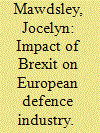

|
|
|
|
|
| Summary/Abstract |
This contribution to the discussion forum considers the impact of Brexit on European defence industry. It argues that while in the short term there is unlikely to be an institutionalised defence relationship between the UK and the EU, that the size of the UK defence budget and technological strength, coupled with NATO membership make it hard to cut the UK out of European armaments cooperation. The contribution suggests however that the uncertainty surrounding both the success of PESCO and the EDF and the outcome of the UK’s Integrated Review makes the future difficult to predict.
|
|
|
|
|
|
|
|
|
|
|
|
|
|
|
|
| 8 |
ID:
177039


|
|
|
|
|
| Summary/Abstract |
This study presents an analytical framework for predicting the conditions under which North Korea would choose a particular nuclear strategy. Based on the assessment of North Korea’s strategic environment, which involves its national identity and interests, strategic goals, relations with allies, and military capabilities, the nuclear strategy choice model presented in this study explains how North Korea’s beliefs about its relative capabilities vis-à-vis the US and South Korea determine its strategy regarding the employment of nuclear weapons. As such, this study represents a necessary extension of the prior literature, which has focused on static theories concerning North Korea’s nuclear strategy. This study concludes by offering policy recommendations for dealing with a nuclear-armed North Korea.
|
|
|
|
|
|
|
|
|
|
|
|
|
|
|
|
| 9 |
ID:
177047
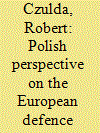

|
|
|
|
|
| Summary/Abstract |
It is a cliché to say that Europe, including its underfunded defence industry, faces numerous challenges and threats. Nevertheless, it is impossible not to notice or to ignore issues, such as the current economic crises, which are likely to last for a long period of time, an ageing population (resulting in increased spending on social programmes, including healthcare), and migration (which forces governments to invest more in internal security rather than on hard defence). However, there are also new challenges which will place additional pressure on European defence industry. One such factor, which cannot be underestimated, is the emerging influence of China and its defence companies. According to SIPRI, in recent years three Chinese defence producers ranked in the world’s top 10 producers. 1 This means that in the near future, European companies will have more competitors, capable of offering more favourable conditions – cheaper products and attractive credit – than their European counterparts.
|
|
|
|
|
|
|
|
|
|
|
|
|
|
|
|
|
|
|
|
|